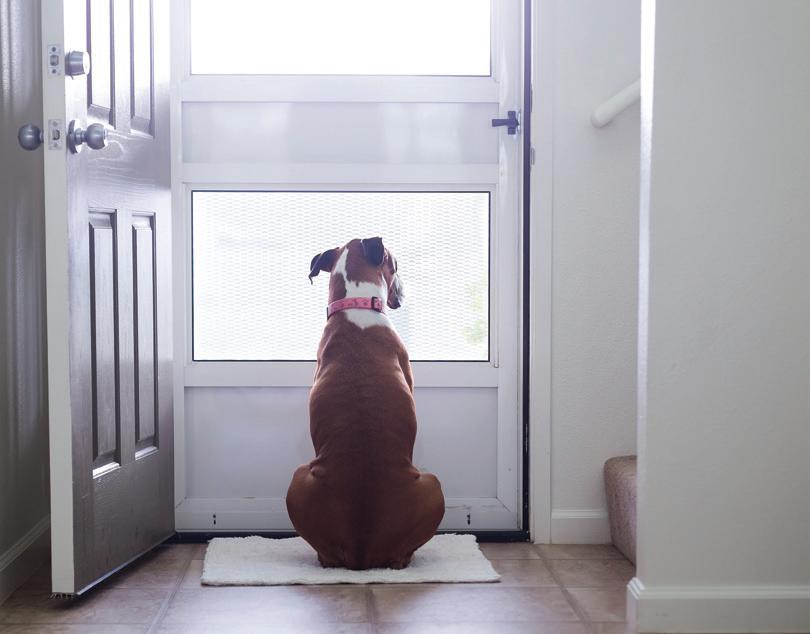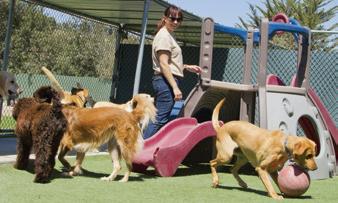
5 minute read
PETS
Dog Days of Summer
BY BETH LAWTON
It was a pet owner’s worst nightmare: We left our beaglelab mix, Chloe, with a colleague while we jaunted off to the West Coast (pre-pandemic). Just hours after we left, Chloe bolted from the unfamiliar-to-her home in Arlington and was lost for nine days.
Much of our vacation was spent on the phone coordinating search-and-rescue efforts from afar. Someone found her hiding in their backyard and called Arlington Animal Control, and although she was dehydrated, tired, dirty and scared, she went on to live a long, happy life with us.
But every time we went on vacation after that, we either took her with us or had a pet sitter come to our house, where we knew she was comfortable and safe.
An increasing number of resorts, Airbnbs and vacation spots are pet-friendly, but sometimes it’s just not possible to bring your dog or cat on the road with you. When that’s the case, you have a few options — primarily boarding your dog somewhere or hiring a pet-sitter.
Your goal should be to spend your vacation relaxing, confident that your best furry friend is happy and cared for. Your pet-owning friends or neighbors may be able to give you some initial recommendations for your pet, but you should still do your own research and preparation. If you choose to board your dog at a kennel, doggy day care or another boarding facility, there are a few critical things to look out for (aside from price), according to the American Kennel Club:
• Be sure to schedule a tour in advance so you can see the facilities, including, especially, where your pet will be sleeping and spending most of their awake time.
• Find out what certifications or memberships the facility has, and how recently the facility was recertified.
• Check online reviews and ask for references.
• Make sure the facility seems clean, sanitary, securely fenced and that there is enough staff on site.
• Find out what happens if your dog has any unexpected needs, such as a medical emergency. • Try to observe staff interacting with animals on site.

• Consider letting your dog do a trial night at the facility before your trip.
If you choose to hire a pet sitter to come to your home, the National Association of Professional Pet Sitters has these tips:
• Try to develop a relationship with the pet sitter before you leave, including having them visit your home to meet your pet. Make sure the pet sitter knows where all relevant supplies are and what to do in an emergency.
• Check online reviews, the pet sitter’s website (if they have one) and ask for references.
• Make sure the pet sitter has a back-up system in the event that an emergency makes it hard to care for your pet. (You may want to set up a back-up system with a neighbor or friend, for extra security.)
• Ensure that the pet sitter has, at a minimum, liability insurance.
• Sign a contract in writing so both you and the pet sitter understand the requirements, payment terms and communication expectations.
Happy Returns

BY AUDREY ALESSI, Animal Welfare League of Alexandria
With the wave of a wand, Spot can go from being a lost animal to a pet who is returning home to his family. It’s not magic. It’s microchipping.
As a pet owner, you have probably heard of microchips, even if you aren’t familiar with how helpful they can be. Pet owners often don’t consider their pets’ microchips until a pet goes missing. Hopefully, your best friend will never slip out of their harness or dart out the front door, but if they do, a microchip — in addition to a collar with identification — is a simple way to help reconnect pets with their families. Now the Animal Welfare League of Alexandria (AWLA) is making it easier than ever for pet owners to have their pets microchipped.
“We want to make sure that every pet owner has access to the benefits a microchip provides so their pet can be reunited with their family in the event they become lost,” says AWLA Director of Community Programs Joanna Fortin. “We are proud to offer monthly microchip and vaccination clinics to our community at an affordable rate to ensure that financial barriers don’t keep lost pets from making their way back home.”
Microchipping can be one of the best and most universal ways of connecting pets with their families. A microchip is a glass-enclosed chip as small as a grain of rice that is embedded under your pet’s skin. When scanned, the microchip it reveals a unique number, that, when looked up, can provide contact information for the owner.
Depending on how you met your best friend, they might already have a microchip. Dogs, cats and rabbits adopted from the AWLA all have microchips, but pet owners still need to register those chips with their own information, and make sure to keep their contact information up to date. More resources for pet owners include a universal microchip lookup tool at PetMicrochipLookup.org and a free registry database at FoundAnimals.org. Microchips will sometimes have a one-time cost associated with registering, but after that, pet owners only need to keep their contact, address and emergency information up to date.
Now you ask yourself: Does my pet have a microchip? Animal hospitals, animal shelters or rescue organizations and even many pet supply stores have microchip scanners, so if you didn’t receive microchip information with your pet, you can easily find their chip number. The AWLA recommends that at annual veterinary check-ups, you have your pet scanned to make sure the chip is still functioning properly.
If your pet doesn’t have a microchip, the AWLA offers an easy and low-cost solution. On the first Wednesday of each month, you’ll find the shelter’s parking lot full and dogs on leashes and cats in carriers being transported to and from the building by AWLA volunteers. These drive-up vaccination and microchip clinics are the AWLA’s solution to providing rabies and distemper vaccines to pets in the community by appointment, while keeping everyone at a safe physical distance.
“Since we’ve begun offering microchipping at our monthly vaccine clinics,” Fortin says, “we’ve seen an enormous amount of interest in this service. Alexandrians love their pets and are very grateful for the added safety net a registered microchip offers.”
If microchips seem like a simple safeguard for you pet, it’s because they are. By keeping them registered, up to date and checked annually, pet owners can have peace of mind knowing that if their best friend goes missing, with a quick scan, they’ll be able to find their way home.
The Animal Welfare League of Alexandria hosts low-cost rabies, distemper and microchip clinics on the first Wednesday of every month at their location at 4101 Eisenhower Ave. Learn more and schedule your appointment at AlexandriaAnimals.org/RabiesClinic.





